Hey there!
Have you ever thought about switching to bamboo toilet paper? Trust me, it’s a game-changer!
In this article, I’ll tell you all about why you should consider making the switch for waste reduction.
Not only is bamboo a sustainable resource, but it also helps reduce deforestation and conserve water.
Plus, it has a lower carbon footprint and is biodegradable.
Let’s dive in and discover the many benefits of using bamboo toilet paper for a greener future!
The Environmental Impact of Traditional Toilet Paper
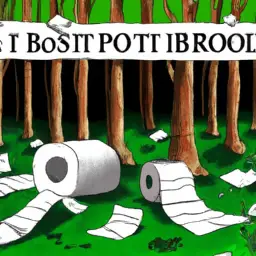
The article explores the environmental impact of traditional toilet paper and its potential consequences on waste reduction. When it comes to toilet paper, most people don’t think about the environmental concerns associated with it. However, the truth is that traditional toilet paper production has a significant impact on our environment.
Firstly, traditional toilet paper is made from virgin wood pulp, which means that countless trees are cut down to produce it. This deforestation not only leads to habitat destruction for countless plant and animal species, but it also contributes to climate change by reducing the Earth’s ability to absorb carbon dioxide.
Secondly, the production of traditional toilet paper involves a substantial amount of water and energy usage. From the processing of the wood pulp to the bleaching and packaging processes, large quantities of water and energy are consumed, leading to increased carbon emissions and water pollution.
Given these environmental concerns, it’s essential to explore alternative options. One such option is bamboo toilet paper. Bamboo is a fast-growing plant that can be sustainably harvested without causing deforestation. It requires fewer pesticides and fertilizers compared to traditional wood pulp, making it a more eco-friendly choice.
Benefits of Bamboo as a Sustainable Resource

Bamboo is an abundant and renewable resource, making it an excellent choice for sustainable products. When it comes to bamboo farming, it is important to note that bamboo is one of the fastest-growing plants in the world. It can reach full maturity in just 3-5 years, compared to hardwood trees that take decades to grow. This rapid growth rate makes bamboo a highly renewable resource, as it can be harvested and regrown relatively quickly.
One of the key benefits of bamboo as a sustainable resource is its ability to absorb carbon dioxide and release oxygen into the atmosphere. According to research, bamboo can absorb up to four times more carbon dioxide compared to other plants. This makes bamboo an effective tool in combating climate change and reducing greenhouse gas emissions.
Additionally, bamboo requires minimal resources to grow. It does not need pesticides or fertilizers, as it has natural defenses against pests and diseases. This not only reduces the environmental impact of bamboo farming but also makes it a cost-effective and sustainable option for farmers.
To summarize the benefits of bamboo as a sustainable resource, I have created a table below:
| Benefits of Bamboo as a Sustainable Resource |
|---|
| Rapid growth rate |
| High carbon absorption capacity |
| Minimal resource requirements |
| Natural pest and disease resistance |
How Bamboo Toilet Paper Reduces Deforestation
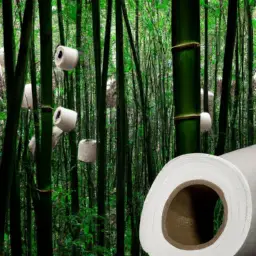
When considering the environmental impact of toilet paper production, one must recognize how bamboo toilet paper significantly reduces deforestation over time. The bamboo toilet paper industry has gained traction as an eco-friendly alternative to traditional materials. Unlike traditional toilet paper, which is made from wood pulp sourced from trees, bamboo toilet paper is made from fast-growing bamboo plants. Bamboo is a highly renewable resource that can be harvested within just a few years, compared to trees that take decades to mature.
By using bamboo as an alternative to traditional materials, the demand for wood pulp decreases, resulting in less deforestation. The rapid growth rate of bamboo allows for more efficient and sustainable production. Moreover, bamboo requires minimal water and no pesticides to grow, making it an even more appealing choice for environmentally conscious consumers.
In addition to reducing deforestation, the bamboo toilet paper industry also helps to preserve natural habitats and protect biodiversity. By sourcing bamboo from sustainably managed plantations, the impact on wildlife and ecosystems is minimized. This makes bamboo toilet paper a responsible choice for those who want to reduce their environmental footprint.
Bamboo Toilet Paper and Water Conservation
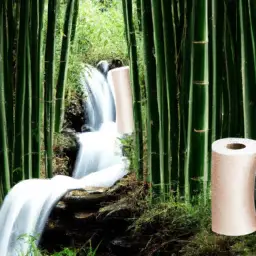
Using bamboo toilet paper conserves water during production due to the plant’s ability to thrive with minimal irrigation. This is particularly important in the context of water scarcity and the need to reduce environmental pollution. Bamboo is known for its remarkable water efficiency, requiring significantly less water compared to traditional tree sources like spruce and pine. This makes it an environmentally friendly alternative for toilet paper production.
To highlight the water conservation benefits of bamboo toilet paper, consider the following table:
| Bamboo | Traditional Tree Sources | |
|---|---|---|
| Water Consumption | Requires minimal irrigation | Requires substantial water resources |
| Water Scarcity Impact | Helps reduce water scarcity by using less water | Contributes to water scarcity due to high water consumption |
| Environmental Pollution | Helps reduce pollution by minimizing water usage | Contributes to pollution through excessive water consumption |
As the table demonstrates, opting for bamboo toilet paper helps address the issues of water scarcity and environmental pollution. By choosing this sustainable alternative, we can conserve water resources and contribute to a cleaner, healthier environment.
Reduced Carbon Footprint With Bamboo Toilet Paper
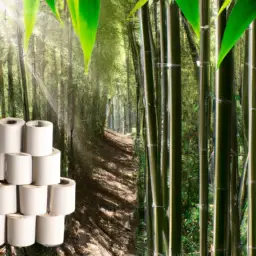
I can reduce my carbon footprint by choosing bamboo toilet paper instead of traditional options. Bamboo is a highly sustainable alternative that offers significant environmental benefits. One of the key advantages of bamboo toilet paper is its reduced carbon footprint.
Bamboo grows incredibly fast and requires minimal water and no pesticides or fertilizers. This makes it a renewable and eco-friendly resource. Compared to traditional toilet paper made from trees, bamboo toilet paper production emits significantly fewer greenhouse gases. Additionally, bamboo has a higher carbon offsetting capacity than most trees. It absorbs more carbon dioxide from the atmosphere, helping to mitigate climate change.
By using bamboo toilet paper, I can contribute to reducing carbon emissions and combatting global warming. Furthermore, the production process for bamboo toilet paper is generally more sustainable. It involves less water consumption and uses fewer chemicals compared to the production of traditional toilet paper.
This means that I’m not only reducing my carbon footprint, but also minimizing my impact on water resources and reducing pollution. By making a simple switch to bamboo toilet paper, I can actively participate in reducing my carbon footprint and choosing a more sustainable alternative for a greener future.
The Biodegradability of Bamboo Toilet Paper
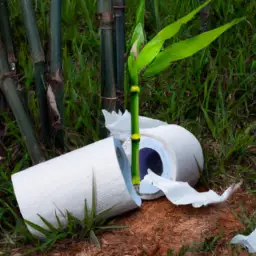
Bamboo toilet paper is highly biodegradable, making it a sustainable choice for waste reduction. Biodegradability refers to the ability of a substance to break down naturally and return to the environment. Traditional toilet paper, which is made from virgin wood pulp, can take several weeks to several months to decompose. In contrast, bamboo toilet paper decomposes much faster due to the natural properties of bamboo fibers. The biodegradability of bamboo toilet paper helps to reduce the amount of waste that ends up in landfills, as it breaks down quickly and easily.
Not only is bamboo toilet paper biodegradable, but it’s also sustainable. Sustainability refers to the ability to meet present needs without compromising the ability of future generations to meet their own needs. Bamboo is an incredibly renewable resource. It’s one of the fastest-growing plants in the world, with some species growing up to 91 centimeters per day. Bamboo can be harvested without causing damage to the plant or its surrounding environment, as it regrows quickly and doesn’t require replanting.
By choosing bamboo toilet paper, you’re making a sustainable choice for waste reduction. Its biodegradability ensures that it breaks down naturally and doesn’t contribute to the buildup of waste in landfills. Additionally, the sustainability of bamboo as a resource means that its production is environmentally friendly.
Health Benefits of Using Bamboo Toilet Paper

For me, the health benefits of switching to bamboo toilet paper are evident. Not only is it a sustainable and eco-friendly option, but it also offers advantages for our personal well-being. One of the key benefits is that bamboo toilet paper is gentle on the skin, making it an excellent choice for individuals with skin sensitivity.
Bamboo toilet paper is a chemical-free alternative to traditional toilet paper, which often contains harsh chemicals and dyes that can irritate the skin. By using bamboo toilet paper, we can minimize our exposure to these potentially harmful substances and reduce the risk of skin irritation or allergic reactions.
To further highlight the health benefits, let’s take a look at the comparison table below:
| Traditional Toilet Paper | Bamboo Toilet Paper |
|---|---|
| Contains chemicals and dyes | Chemical-free alternative |
| Rough texture | Soft and gentle on the skin |
| Potential for skin irritation | Suitable for individuals with skin sensitivity |
As you can see, bamboo toilet paper provides a safer and more comfortable option for our personal hygiene needs. By making the switch, we can not only contribute to waste reduction but also protect our skin from unnecessary chemicals and potential irritants.
Supporting Ethical and Eco-friendly Brands

Supporting ethical and eco-friendly brands is crucial for promoting sustainable practices and reducing environmental impact. One way to support these brands is by choosing products that are manufactured ethically. Ethical manufacturing ensures that workers are treated fairly, wages are fair, and working conditions are safe. By supporting brands that prioritize ethical manufacturing, we can contribute to a more equitable society and improve the lives of workers around the world.
In addition to ethical manufacturing, consumer awareness plays a vital role in supporting eco-friendly brands. When consumers are aware of the environmental impact of their purchasing decisions, they can make more informed choices. By supporting brands that prioritize sustainability and eco-friendly practices, consumers can help drive change in the industry. This can lead to a greater demand for eco-friendly products, which in turn encourages more brands to adopt sustainable practices.
By supporting ethical and eco-friendly brands, we aren’t only making a positive impact on the environment, but also supporting companies that align with our values. Together, we can create a more sustainable future and promote a more ethical and responsible way of doing business.
Conclusion
In conclusion, opting for bamboo toilet paper is a simple yet effective way to reduce waste and make a positive impact on the environment. With its sustainable sourcing, reduced deforestation, water conservation, lower carbon footprint, and biodegradability, bamboo toilet paper offers a more eco-friendly alternative.
Additionally, it provides health benefits and supports ethical and eco-friendly brands. Making the switch to bamboo toilet paper is a small change that can make a big difference in waste reduction efforts.


